ALISHA ELENZ REMEMBERS THE NIGHT SHE decided to become a chef, and it took place at the Pete’s Pizza on Granville, owned by her uncle. She’d moved to the city from Palatine some months before, and took a job working the counter at a relative’s business because it was there to be had. If you weren’t served by her at that pizza parlor, you’ve been served by a million other 18-year-olds just like her.
But this night, a cook didn’t show, and her uncle told her to give it a try. “I would always watch them—all it was was making sandwiches and salads and heating up pizza slices, but we had a recipe book, so I kind of dove into it and I had an hour to learn the recipes really quick,” she says.
“I was hooked. I remember that night so clearly—I was like, this is what I’m going to do forever,” she explains. “I remember it being challenging, but I liked that—I liked that I just got thrown into it and had to figure it out.”
The dream was in her blood—that someday she would be a chef. And now, after years of hard work and struggle, she finally—
Actually, that was just in 2013 or so. It’s five years later, and she’s the chef of mfk., Lakeview’s acclaimed Spanish-inspired neighborhood restaurant, which won the first Jean Banchet Award for neighborhood restaurant, back in 2016. At age 23 the diminutive Elenz is telling older and decidedly taller cooks what to do, managing the kitchen for a busy spot that—partly because of size restrictions, partly philosophically—has no walk-ins, no freezers, but has to produce a freshly-prepared Spanish feast every night.
Did I mention she’s never been to Spain?
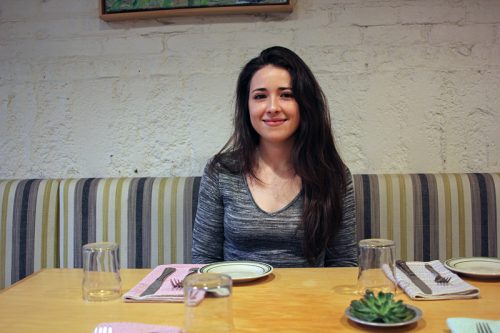
Alisha Elenz
ELENZ LIKED THE NEW RESPONSIBILITIES AT THE pizza parlor, but she quickly realized that “I needed to get out of my uncle’s restaurant and learn other things,” she says. She went to another Rogers Park casual spot, Bop N Grill, but “I knew I needed to start learning about food. I had no idea of what I was getting myself into.”
She got a job working garde-manger at Maude’s Liquor Bar. “I had never even seen an oyster before. I staged there and was really overwhelmed, but I jumped right in. I didn’t go to culinary school or anything—I just thought, this is what I want to do and I dove in headfirst. It was really cool working at Maude’s, it’s a very consistent restaurant and they don’t change their menu around a lot, so it was interesting following their recipes to the exact T, to make sure you get the same result.”
When Maude’s owner Brendan Sodikoff took over the restaurants in the Waldorf-Astoria, she followed her chef there. When she started getting restless again for different experiences, he suggested that she take a part-time prep shift at mfk. She says, “I’d been working with French food for a while so I was kind of like, not bored, but I just wanted to try something different, see if there was something else out there. I walked in the door and I just instantly fell in love with it. There’s a way this place makes you feel when you walk here, that I knew I had to work here.”
I know what she means. mfk. is the archetypal neighborhood place, of the type you often see in Europe (without being too specific to Spain or any other particular country), a small cafe and wine bar with bar, tables and kitchen all basically snug in the same room. Just the fact that you have to step down into it—it’s a half dozen stairs below the street—somehow makes it charming and old-fashioned and homey all at once, like an Italian place run by a guy named Luigi in an old movie.
I was 22 when I became sous, and when I became sous, I asked the chef, do you think I’m ready for this? And he said, ‘Honestly, Alisha, no one’s ever ready for this.’
Luigi’s actual name, however, is Scott, Scott Worsham, recent participant in this Fooditor conversation. He and his wife Sari, who worked for Charlie Trotter back in the day, came back to Chicago from D.C. and elsewhere to open it four years ago. He describes it as “Not really Spanish Spanish. It’s just built on that Spanish philosophy of, you buy good ingredients, and you don’t mess them up.”
Elenz was in tune with that from the start. “I like how intimate and romantic Spanish food is. Yet at the same time, it’s kind of family style. I like that it’s simple food on plates, not complicated, not extra cheffy, it’s literally three or four components. I like the whole shared vibe.” That made it easy for her to roll with the space’s aforementioned limitations, like the lack of walk-in or freezer: “You’re not mass producing, you’re making everything fresh each day. But it’s cool because it makes you work kind of harder. There’s no freezing vegetable stock. When it’s gone, it’s gone. Especially working with seafood, you have to work really hard keeping everything fresh.”
Spain’s own tradition of conservas—canned fish and the like—plays into that way of handling product. “Say we have fresh arctic char for a couple of days, but by the third day, you have some left and you want to get some fresh stuff in,” she says. “So we smoke it and serve it that way,” perhaps with some canned seafood, as they did on a “fisherman’s board” before Christmas.
Since she hasn’t been to Europe—”I want to so bad. As soon as this place can get to a place where it can run itself, I’d love to go to Spain,” she says—I ask her how she makes up for that lack of firsthand experience of the tapas and pintxo scenes. “I have a lot of Spanish cookbooks, a lot of them have been passed down from previous chefs,” she says. “That’s what I’ve gotten from a lot of the chefs, cookbooks and knives.”
“I do a lot of research online,” she says. “I want to know what they’re cooking at their homes. If someone’s going to come here from Spain, I want them to eat the food and say, oh, it reminded me of home. I feel like that would be the best compliment. If you’re doing something right, you’re making someone remember something, and that’s the beauty of food.”
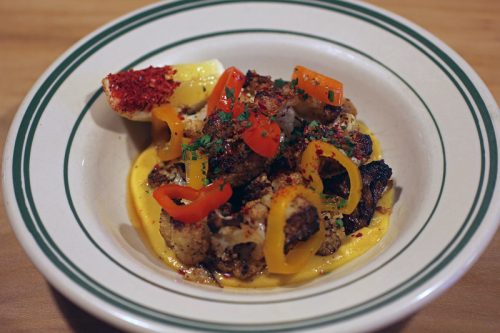
One of Elenz’s new dishes, roasted cauliflower with sweet peppers. “Scott asked me to put cauliflower on the menu, and it was a challenge because my boyfriend hates cauliflower. So I got him to like it.”
“SHE STARTED AS SOMEONE SUPER-GREEN AND NEW to the biz,” Worsham tells me. But after three years at mfk., “She understands the old fashioned things we don’t talk about. She understands things her peers that age don’t get, like numbers and food costs. It’s not just about making fancy food, it’s about making your restaurant viable. She’s become a real professional, and she’s running that team really well.”
Which is evident when our conversation is interrupted a couple of times, for questions from the cooks prepping for dinner in an hour or two. She fields them unselfconsciously, making quick decisions based on what they report about what’s in their pantry, agreeing with them when their suggestions make sense. Her team obviously respects her.
Talking to Elenz, she shows a drive to understand the restaurant beyond her specific tasks in the kitchen. For one thing, she took side jobs working front of house, at Yusho and at a sports bar—not because she wanted to, but because she thought she had to at some point.
“I never wanted to switch over to front of house, but I wanted to understand front of house,” she explains. “I noticed from every place that I worked at that there was this weird rift. One side thinks their job is so much harder, the other side thinks their job is so much harder… what’s the big deal? I have to understand that. Especially if I’m going to own a place someday, I have to know every position.”
And she probably will some day—every experience is feeding her interest in the business. “I’ve had the privilege of seeing a lot of chefs come in and out of this place, I’ve gotten to learn a lot,” she says. “I had a chef at the Waldorf who taught me, even if someone’s the worst kind of person, you can always learn something from them. There’s a reason why you’re here, I’m going to learn something from you! And you nearly always do.”
I wonder if she made her ambition to be a sous chef, and then a chef, known along the way. She says not really. “I didn’t see it coming either time. I don’t know if you’re supposed to see it coming—it’s something that just happens and hey, you’re going to get promoted.”
“Both times chefs left—you kind of just morph into what you have to do. When it happens you don’t really have time to think about it, you just have to keep working,” she says. “I had a moment last week where it hit me like… oh wow, this is my… thing. I’m in charge of this. I’ve never been one of those people who were like, I have to be a chef. Being a chef is fine, but I still get to do the things that I did when I was a line cook. Like, I still get to wash dishes, and prep and work on the line. As long as I still get to do those things, I think I’ll be okay.”
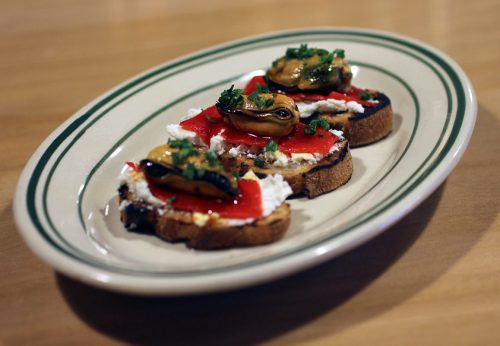
Simple and classic: mussels escabeche
“I was 22 when I became sous, and when I became sous, I asked the chef, do you think I’m ready for this? And he said, ‘Honestly, Alisha, no one’s ever ready for this. People when they’re 30 aren’t ready for it, so just do it. And if you fail you fail, but at least you tried.’ If you stop and try to remind yourself to have fun, and you have good people behind you, it’s so much easier.”
At 23, she’s convinced that she’s a lifer for the business. She questions whether she would have committed to it five years ago “knowing how hard it is,” but now she’s in it to stay.
“I can’t picture myself doing anything else,” she says. “The majority of my life is work. A lot of times people ask me, how do you not get sick of that? I just really really enjoy what I do, I love being here and I love creating food, I love working with people and teaching people. When you love what you do it makes it a lot easier to work 70, 80 hours a week. You’re not thinking about it like Oh, I’m working—you’re thinking about it like I’m here, this is fun!”
Michael Gebert is big tuna as editor of Fooditor.
Latest
Join the Discussion
After you comment, click Post. If you're not already logged in you will be asked to log in or register with Disqus.





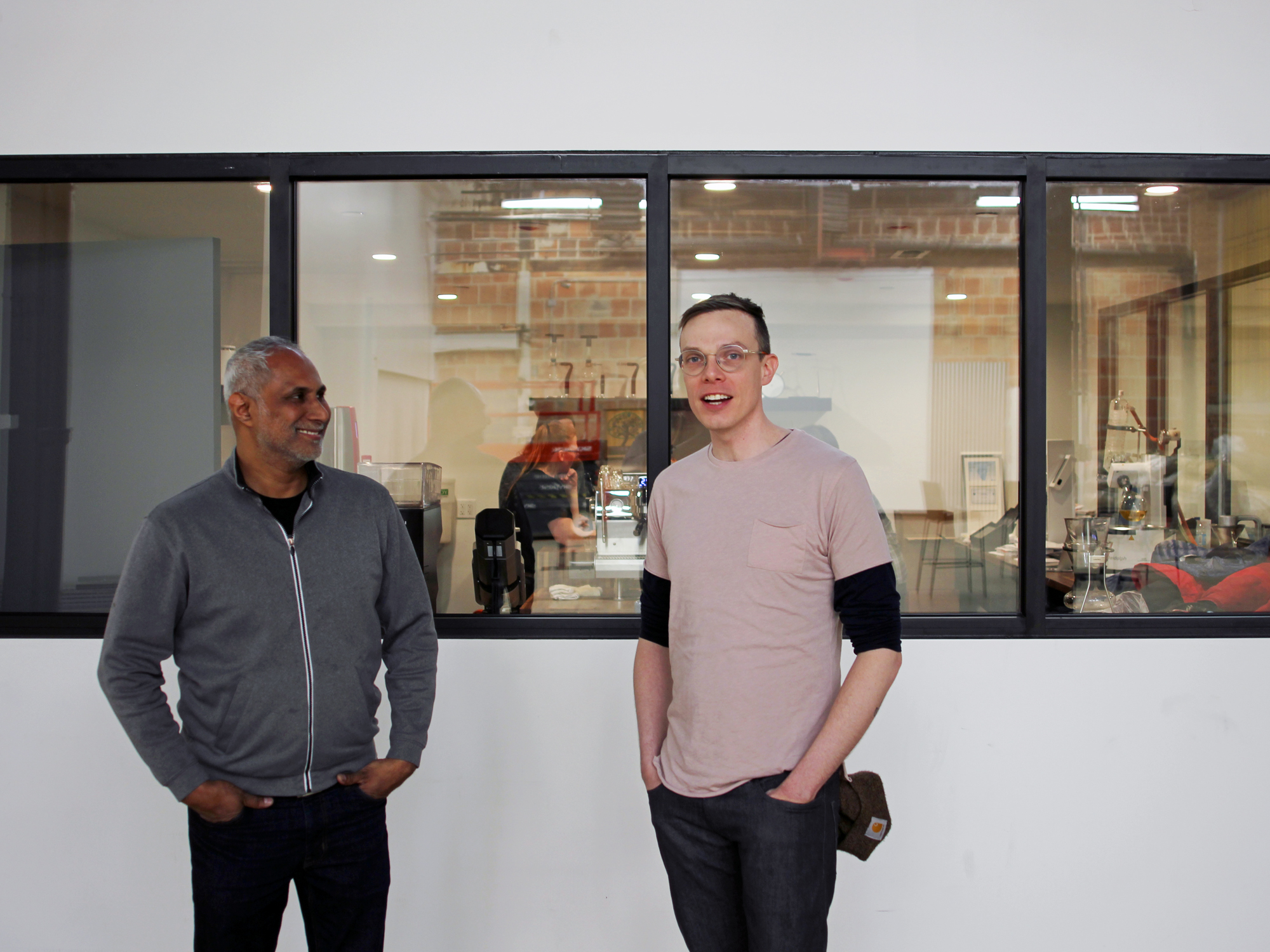
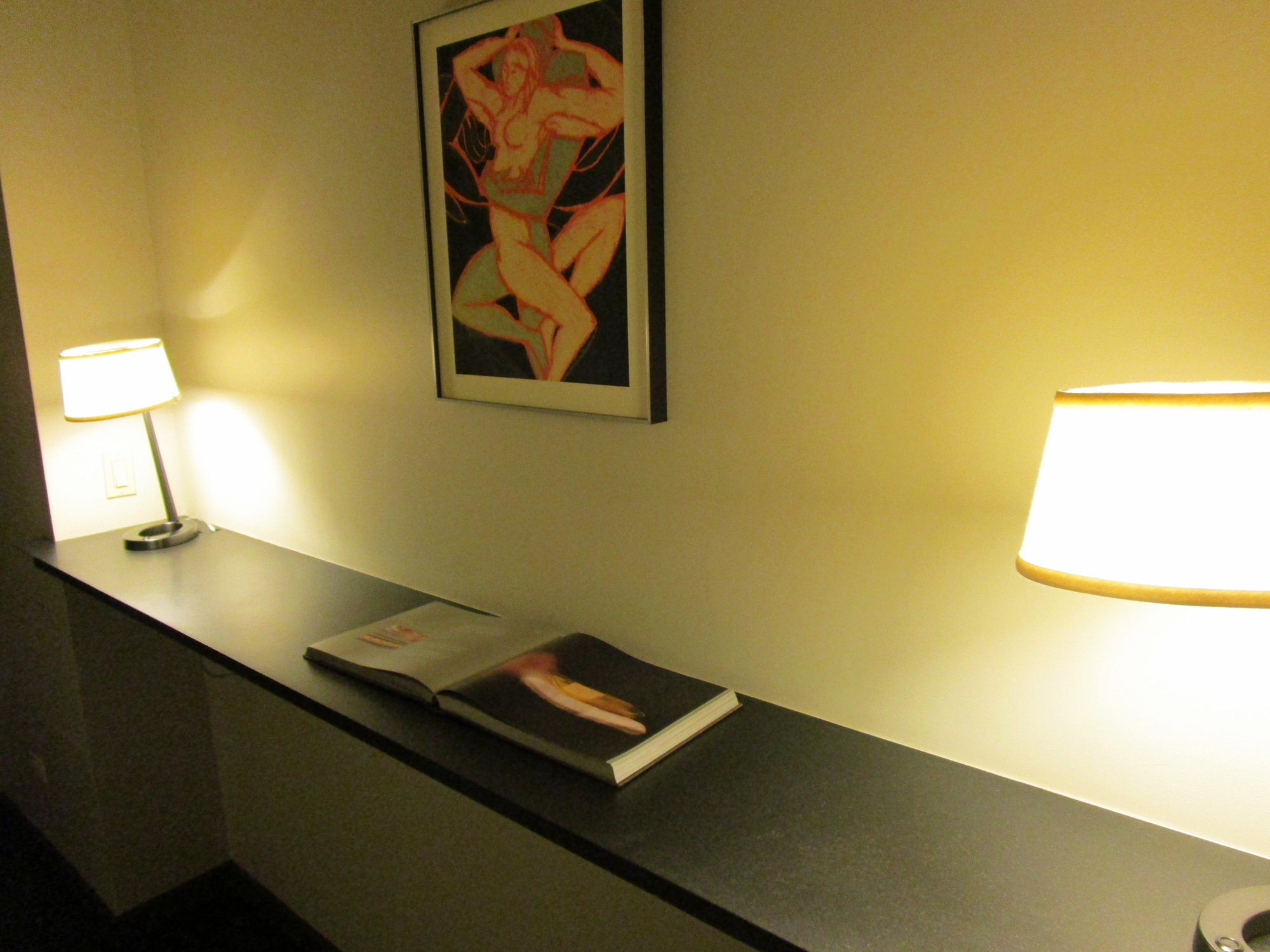
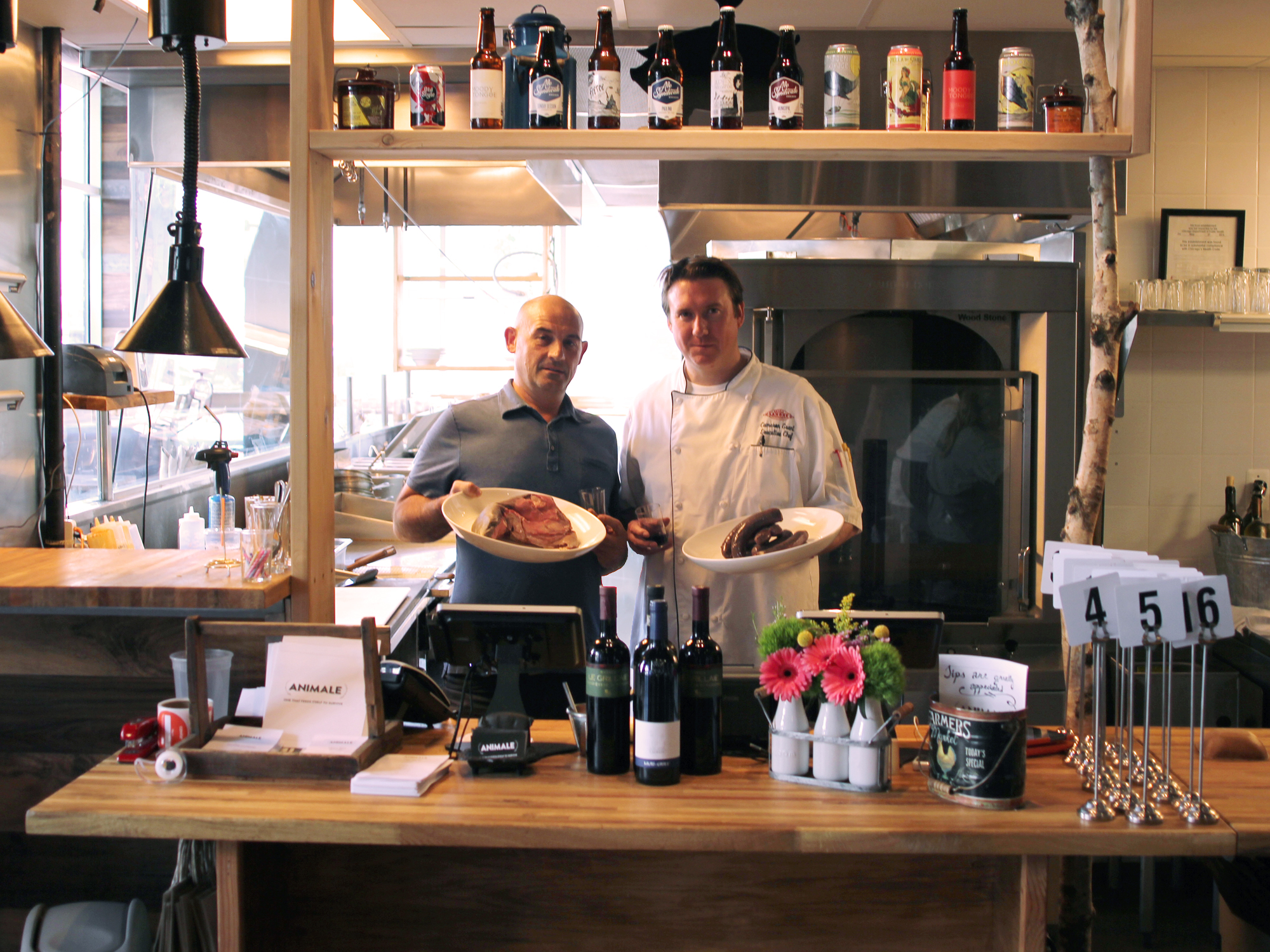
Great article. Very Exciting. I’m sure that mfk’s namesake, M.F.K. Fisher loves the fact that there is now a female chef at the restaurant (no disrespect to Sari, of course). And Alisha Elenz sounds like her great vision and attitude will take her, and mkf, far. I wish I lived in Chicago, as this would definitely be a go-to place for me. (Oh, by the way, in the interest of full disclosure, M.F.K. Fisher was my mother and shared many of Ms. Elenz’ beliefs and attitudes about food!)
Kennedy, you’re the greatest! I wish we lived closer together so we could have loads of boozy lunches together. Love you!